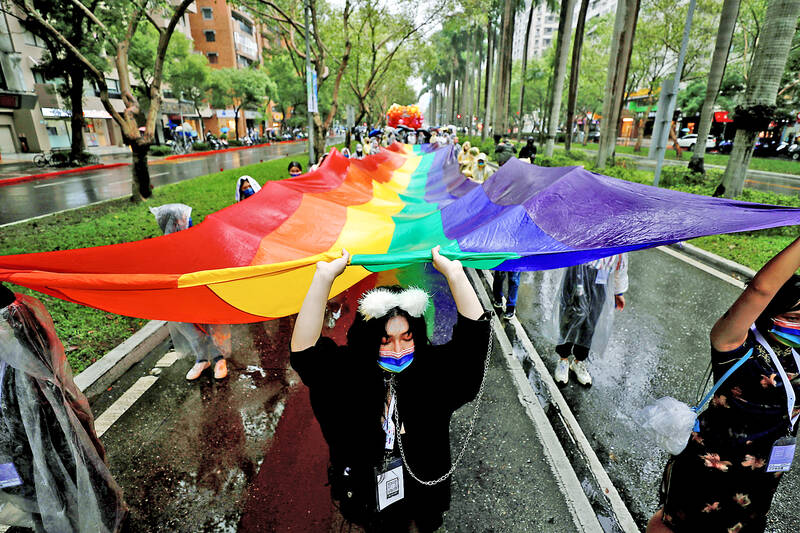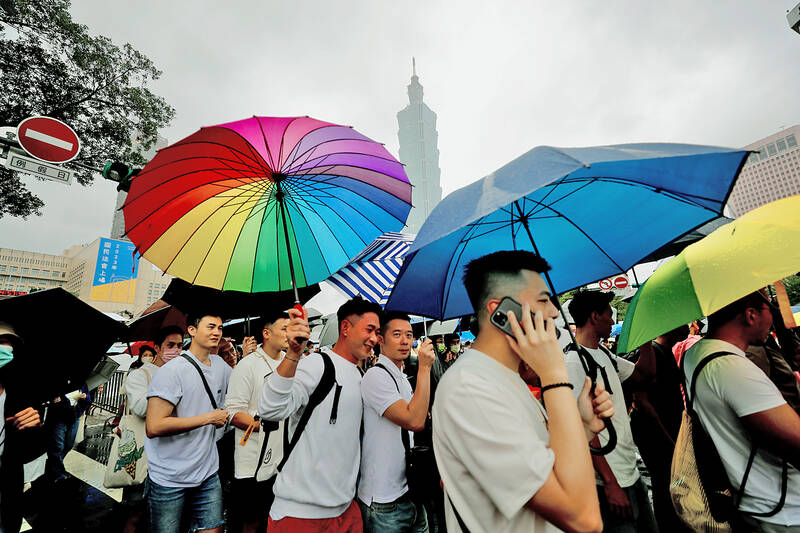About 120,000 people, many carrying rainbow flags, marched through Taipei yesterday to celebrate LGBTQ+ equality in East Asia’s largest Pride parade.
Taiwan legalized same-sex marriage in 2019 in a first for Asia, and is proud of its reputation as a bastion of LGBTQ+ rights and liberalism.
The rainy streets of central Taipei were packed for the annual parade, the 20th since it began, including go-go dancers and drag queens on the back of colorfully decorated trucks, joined by several senior members of the Democratic Progressive Party (DPP).

Photo: Ritchie B. Tongo, EPA-EFE
“I’m very proud that Taiwan has Pride,” said social worker Chang Chi, 28, who took part with her girlfriend. “Taiwan is the first place where same-sex marriage was legalized in Asia. That’s not possible in many countries. Taiwan is a place where you can be who you are.”
Organizers put the number of attendees at 120,000, some of whom also carried flags and banners in support of Tibet, Hong Kong and Ukraine.
President Tsai Ing-wen (蔡英文) wrote on Facebook that people could scarcely have imagined 20 years ago that Taiwan would have lead the way in legalizing same-sex marriage in Asia.

Photo: Ritchie B. Tongo, EPA-EFE
“Now, being able to choose marriage is something that most people find commonplace,” she wrote.
The event took place one month before the local elections, a key test of support for the DPP and the main opposition Chinese Nationalist Party (KMT) ahead of presidential and parliamentary polls in early 2024.
Former vice president Chen Chien-jen (陳建仁) led the DPP’s delegation along with the party’s Taipei mayoral candidate, Chen Shih-chung (陳時中), who oversaw Taiwan’s fight against COVID-19 when he was health minister, marching behind a banner reading: “Democracy supports gays.”
Independent Taipei mayoral candidate Vivian Huang (黃珊珊) also attended the event, saying she “supports individual freedoms.”
She first participated in the march 20 years ago and has attended annually in the past few years, she said, adding that promoting equal rights is an established policy in Taiwan.
KMT Taipei mayoral candidate Chiang Wan-an (蔣萬安) did not attend the event, saying his itinerary for the day had already been arranged, but issued a statement saying that he had voted in favor of same-sex marriage, and that his stance on marriage and gender equality was “very clear.”
Taiwan’s openness to LGBTQ+ issues stands in marked contrast with China, which has been ramping up military pressure to assert its sovereignty claims over the nation.
While same-sex relations are not illegal in China, same-sex marriage is, and the Chinese government has been cracking down on depictions of LGBTQ+ people in the media and on the community’s use of social media.
Taiwan Pride was held a day after about 3,000 people marched in Taipei’s Ximending (西門町) area to show support for the transgender community.
The event, organized by the Taiwan Tongzhi Hotline Association, called for more understanding of and respect for transgender people in Taiwan.
Since 2018, the LGBTQ rights group has organized the marches every year on the eve of Taiwan Pride, with the exception of last year, due to COVID-19 concerns.
The group told reporters that transgender people often encounter difficulties in the workplace or in public, including medical facilities and restrooms, because of their gender identity or way to express themselves.
They also face discrimination and stigmatization from people who lack awareness of or openness toward the transgender community, the group said.
It called on the government to quickly revise regulations so that transgender people could freely change the gender on their national identification card and national insurance card to the sex they identify with or to a nonbinary gender.
The law requires that transgender people obtain two gender incongruence diagnoses and prove that they have undergone gender confirmation surgery before applying to change the gender on their ID card.
However, the Taipei High Administrative Court in a landmark lawsuit last year ruled that household registration offices must allow a transgender women to change the gender on her ID card without submitting proof of surgery.
The decision sparked a debate on whether the government should remove the requirement for all transgender people.

FREEDOM OF NAVIGATION: The UK would continue to reinforce ties with Taiwan ‘in a wide range of areas’ as a part of a ‘strong unofficial relationship,’ a paper said The UK plans to conduct more freedom of navigation operations in the Taiwan Strait and the South China Sea, British Secretary of State for Foreign, Commonwealth and Development Affairs David Lammy told the British House of Commons on Tuesday. British Member of Parliament Desmond Swayne said that the Royal Navy’s HMS Spey had passed through the Taiwan Strait “in pursuit of vital international freedom of navigation in the South China Sea.” Swayne asked Lammy whether he agreed that it was “proper and lawful” to do so, and if the UK would continue to carry out similar operations. Lammy replied “yes” to both questions. The

SECOND SPEECH: All political parties should work together to defend democracy, protect Taiwan and resist the CCP, despite their differences, the president said President William Lai (賴清德) yesterday discussed how pro-Taiwan and pro-Republic of China (ROC) groups can agree to maintain solidarity on the issue of protecting Taiwan and resisting the Chinese Communist Party (CCP). The talk, delivered last night at Taoyuan’s Hakka Youth Association, was the second in a series of 10 that Lai is scheduled to give across Taiwan. Citing Taiwanese democracy pioneer Chiang Wei-shui’s (蔣渭水) slogan that solidarity brings strength, Lai said it was a call for political parties to find consensus amid disagreements on behalf of bettering the nation. All political parties should work together to defend democracy, protect Taiwan and resist

By refusing to agree spending increases to appease US President Donald Trump, Spanish Prime Minister Pedro Sanchez threatened to derail a summit that NATO Secretary-General Mark Rutte needs to run smoothly for the sake of the military alliance’s future survival. Ahead of yesterday’s gathering in The Hague, Netherlands, things were going off the rails. European officials have expressed irritation at the spoiler role that Sanchez is playing when their No. 1 task is to line up behind a pledge to raise defense spending to 5 percent of GDP. Rutte needed to keep Spain in line while preventing others such as Slovakia

SHIFT PRIORITIES: The US should first help Taiwan respond to actions China is already taking, instead of focusing too heavily on deterring a large-scale invasion, an expert said US Air Force leaders on Thursday voiced concerns about the Chinese People’s Liberation Army’s (PLA) missile capabilities and its development of a “kill web,” and said that the US Department of Defense’s budget request for next year prioritizes bolstering defenses in the Indo-Pacific region due to the increasing threat posed by China. US experts said that a full-scale Chinese invasion of Taiwan is risky and unlikely, with Beijing more likely to pursue coercive tactics such as political warfare or blockades to achieve its goals. Senior air force and US Space Force leaders, including US Secretary of the Air Force Troy Meink and